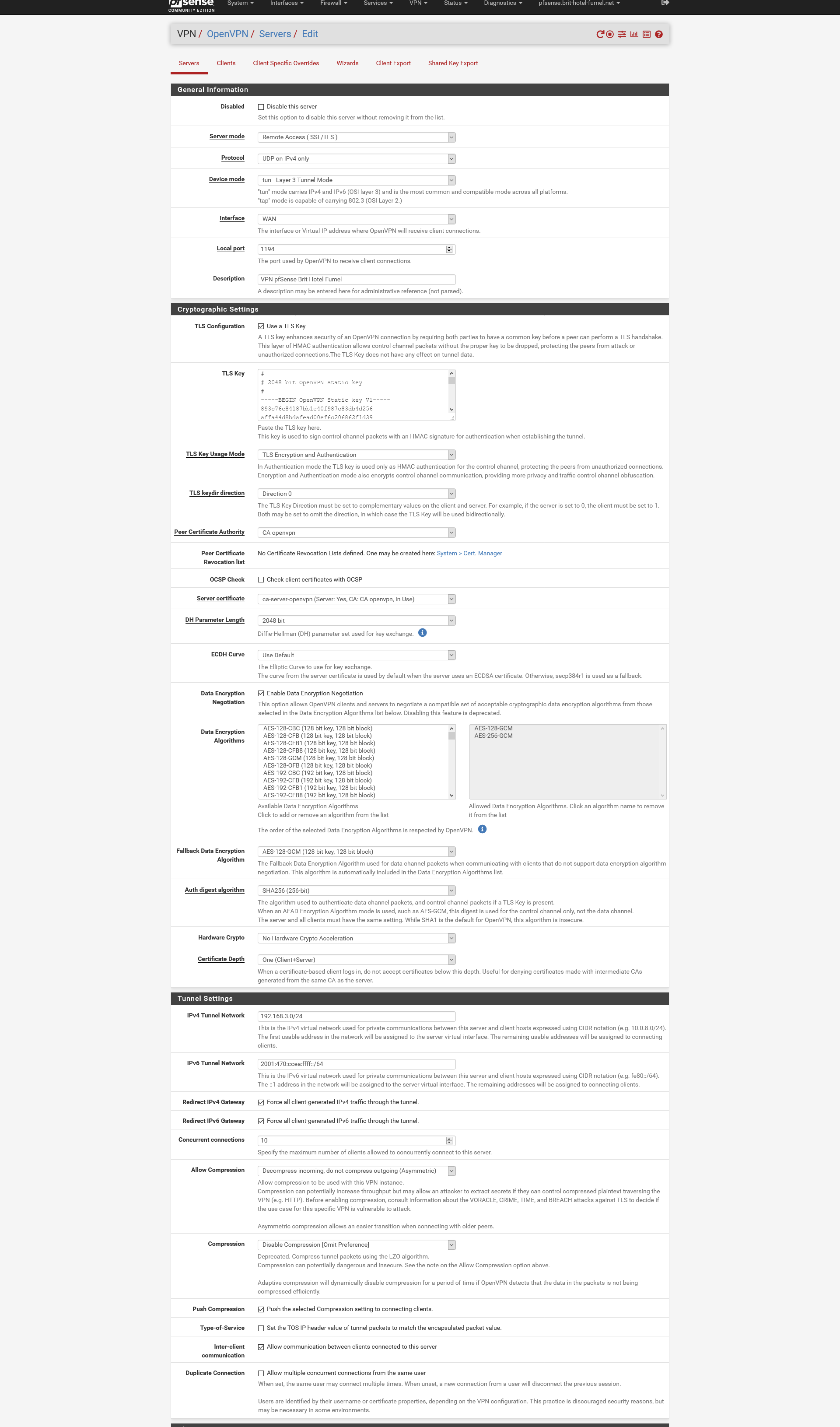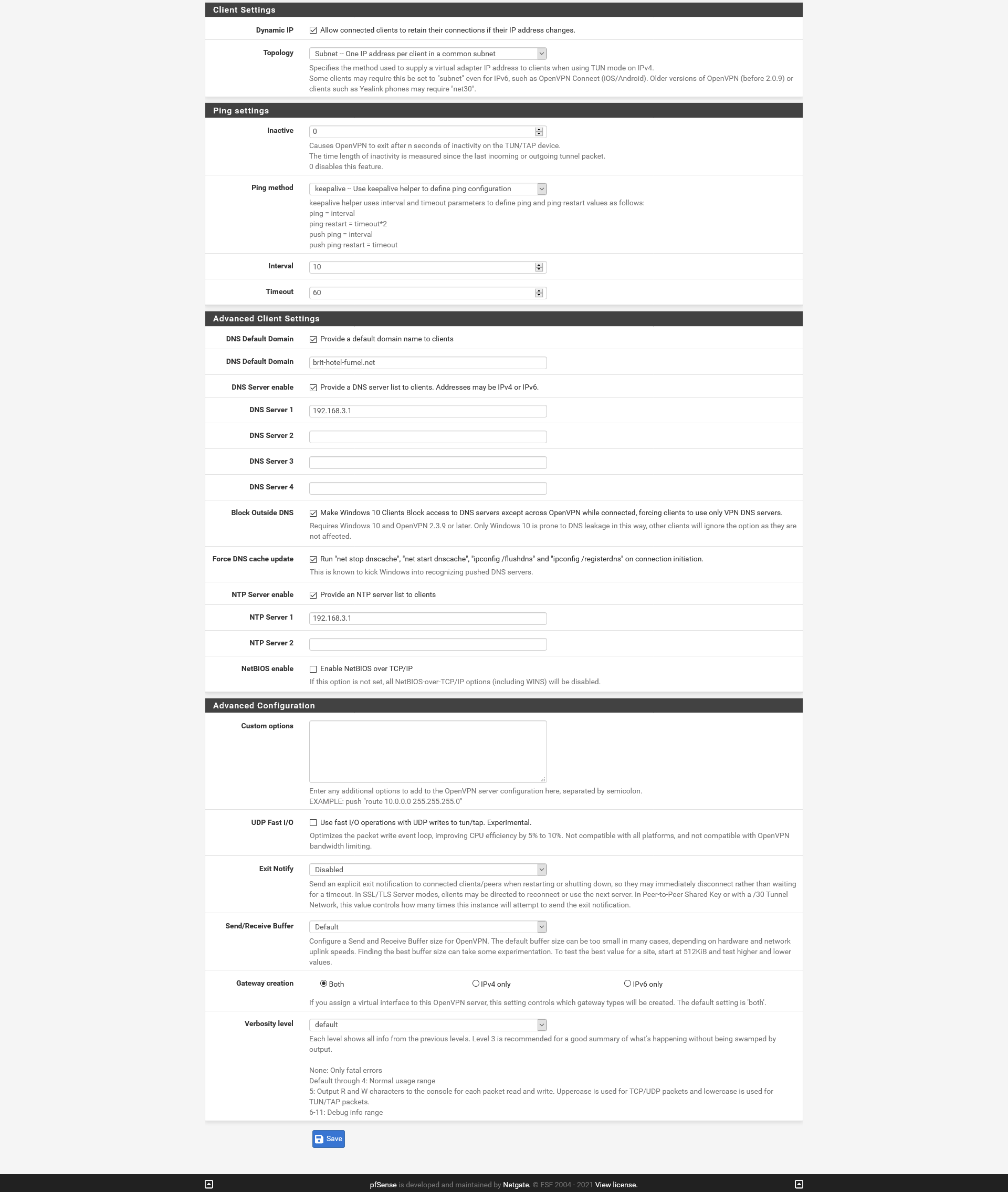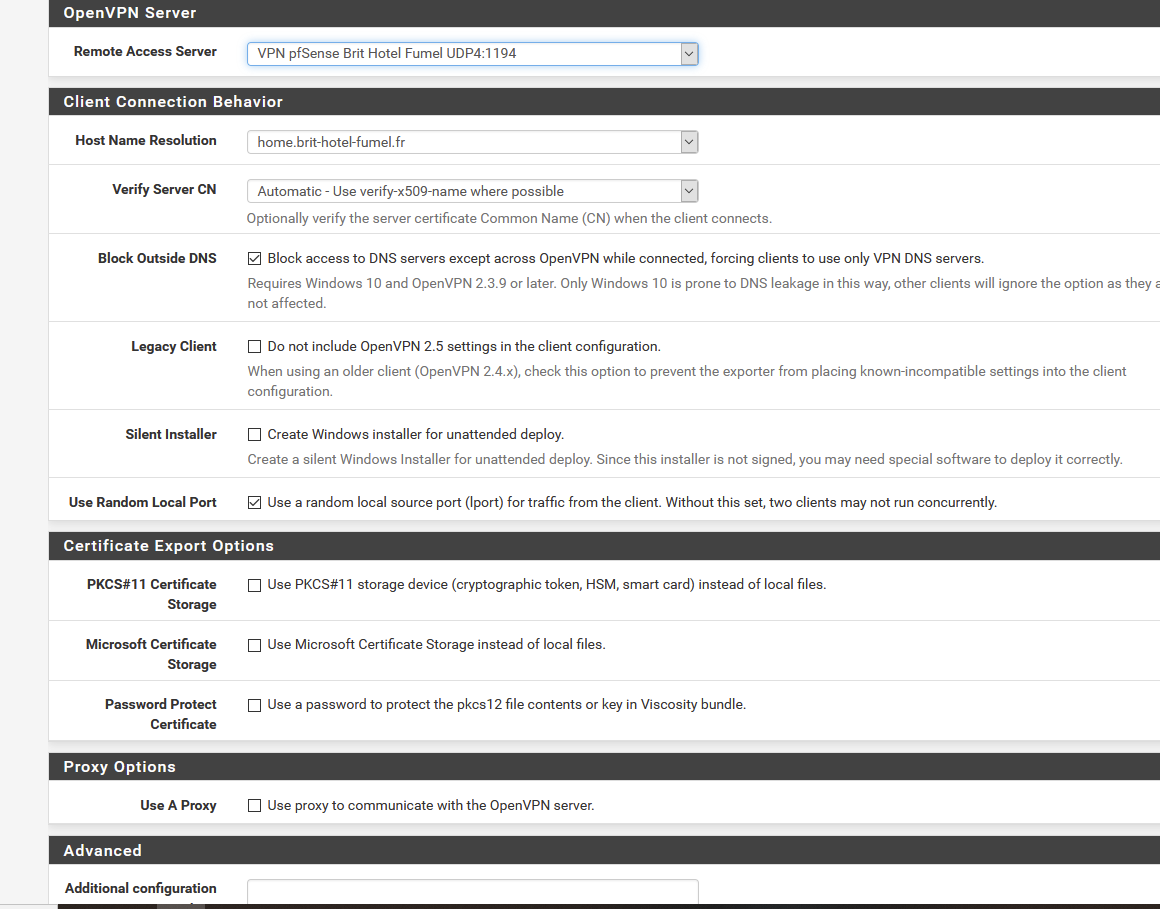OpenVPN fails with 2.50
-
No, I'm not connecting from the same network. I get 2 IPv4 addresses from my ISP. My firewall is on one and my notebook computer on the other.
I used colour coded Ethernet cables. The white ones connect directly to my modem. One goes to my firewall and the other to my notebook. I also have blue for connecting to my LAN and yellow for my test LAN. It helps to keep things straight when testing.

-
I'm using TLS, not user authentication, so no password used.
-
Same problem
-
I just tried again and once again I can connect over the local LAN, but not from outside my firewall. I have the same firewall rule for it since 2017.
-
In VPN>OpenVPN>Servers>Edit change Protocol to "UDP on IPv4 only".
-
That's all I have ever used.
-
Here are the relevant parts of the server and client logs:
Server:
Feb 25 10:04:24 firewall openvpn[88273]: 99.245.217.240:32854 TLS Error: TLS key negotiation failed to occur within 60 seconds (check your network connectivity)
Feb 25 10:04:24 firewall openvpn[88273]: 99.245.217.240:32854 TLS Error: TLS handshake failed
Feb 25 10:04:34 firewall openvpn[38758]: WARNING: No server certificate verification method has been enabled. See http://openvpn.net/howto.html#mitm for more info.
Feb 25 10:04:34 firewall openvpn[38758]: NOTE: the current --script-security setting may allow this configuration to call user-defined scripts
Feb 25 10:04:34 firewall openvpn[38758]: TCP/UDP: Preserving recently used remote address: [AF_INET]172.16.0.1:1194
Feb 25 10:04:34 firewall openvpn[38758]: UDPv4 link local: (not bound)
Feb 25 10:04:34 firewall openvpn[38758]: UDPv4 link remote: [AF_INET]172.16.0.1:1194Client - OpenSUSE 15.2 network manager
2021-02-25T10:04:23.967189-05:00 E520 NetworkManager[1467]: <warn>
[1614265463.9636]
vpn-connection[0x5649aad226e0,58407612-4bce-4c1b-9421-3dcc15e7f6e7,"firewall-UDP4-1194-E520-config",0]:
VPN connection: connect timeout exceeded.
2021-02-25T10:04:23.971490-05:00 E520 nm-openvpn-serv[5314]: Connect
timer expired, disconnecting.
2021-02-25T10:04:23.974072-05:00 E520 nm-openvpn[5317]: SIGTERM[hard,]
received, process exiting
2021-02-25T10:04:23.974457-05:00 E520 NetworkManager[1467]: <warn>
[1614265463.9729]
vpn-connection[0x5649aad226e0,58407612-4bce-4c1b-9421-3dcc15e7f6e7,"firewall-UDP4-1194-E520-config",0]:
VPN plugin: failed: connect-failed (1)
2021-02-25T10:04:23.974809-05:00 E520 NetworkManager[1467]: <info>
[1614265463.9730]
vpn-connection[0x5649aad226e0,58407612-4bce-4c1b-9421-3dcc15e7f6e7,"firewall-UDP4-1194-E520-config",0]:
VPN plugin: state changed: stopping (5)
2021-02-25T10:04:23.975133-05:00 E520 NetworkManager[1467]: <info>
[1614265463.9730]
vpn-connection[0x5649aad226e0,58407612-4bce-4c1b-9421-3dcc15e7f6e7,"firewall-UDP4-1194-E520-config",0]:
VPN plugin: state changed: stopped (6)As I mentioned earlier, it will connect when the client is on the LAN side of pfsense, but not WAN side. The client is OpenVPN 2.5.1, but I had similar results with 2.4.3.
-
@jknott
If you can connect on LAN, I would think the server config is fine?
Wondering now what did you set in the gui, did you change interface from WAN to LAN for that test or is it set to Any (and thus it listens on all if's)?
I've upgraded 5d ago to 2.5.0, and have 2 openvpn instances running without issues, where one serves a "Peer to Peer" for a pfSense still running 2.4.x. also with only certs and no user auth. No change has been done on that one, it reconnected after upgrade so at least we (I) know it can work...Did you try rebooting?

-
@bennyc said in OpenVPN fails with 2.50:
If you can connect on LAN, I would think the server config is fine?
My thought too.
Wondering now what did you set in the gui, did you change interface from WAN to LAN for that test or is it set to Any (and thus it listens on all if's)?
It's set to WAN, but I have tried any. No difference
Did you try rebooting?
Several times.
-
@jknott
Just curious, but has your only test been off the same CPE? I've seen strange behavior between clients on the same ISP (Cough... Comcast)
Maybe verify from somewhere external. -
I have 2 IPv4 addresses from my ISP. With my notebook plugged into the same modem as my firewall, I get a different address. So, it would appear as though it was another customer with my ISP. BTW, I have used this setup for years, for testing. However, I just tried tethering with my cell phone and that seems to work. I wonder what's different with 2.5.0, as this using my 2nd IPv4 address worked with the pfsense 2.4.5, as I have done many times. My firewall rule for OpenVPN hasn't changed since Sept. 19, 2017 and the source is any. Also, why is it allowing a connection from the LAN?
-
- Make sure your default gateway is set to your WAN gateway on System > Routing
- Try setting the OpenVPN server Protocol value to "UDP IPv4 and IPv6 on all interfaces (multihome)"
-
I have only used IPv4 for the UDP packets, as I run into DNS issues, due to the IPv4 host name being an alias and IPv6 being an actual address. Regardless, this worked reliably until I updated to pfsense 2.5.0. I can ping pfsense from my notebook and both the OpenVPN logs and Packet Capture show the connection is being attempted. The gateway is correct as it has been since I started using pfsense 5 years ago. Connecting the VPN in this manner most recently worked the day before I updated to 2.5.0, when I was testing for an issue with the Windows client. I normally use the VPN with Linux.

-
Wow, detail are not missing here ....
This is what I have :

The settings :
.....

Ok, cut in half :


When exporting :

Note : I do accept the new "2.5.0 OpenVPN stuff".
When I export, I only use one of these button :

Result : using the iPhone OpenVPN Connect App (the official one ?!) it connects using IPv4 - IP ok - also received an IPv6 (correct address) but IPv6 is out.
I can live with that.@home, I use the OpenVPN connect version 2.4.9 or 2.4.10 (have to check - it from last year) NOT the latest 2.5.1 from yesterday or so (and yes, shame or Netgate for not pushing that one out the minute it came out of the oven, I'm with you here
 )
)It connects with any (or just one) warnings just fine !
IPv4 and IPv6 are up !My OpenVPN servers bind to my WAN = 192.168.10.3 - I have an upstream ISP router with its NAT rule stuff for VPN on port 1194-UDP.
"Works for yers" .Now this seems strange. I presumed that I needed to upgrade at least my Windows 10 home OpenVPN connect App, but no ... it was working and kept on working.
Btw : my routes :

I never use my VPN client facilities (I do have a xxxxVPN to play with) - they are just there so I can fool around with it so I can maybe once understand some one wants to tunnel my already TLS encrypted traffic.
I'm using he.net for my IPv6 because, well, you know why.edit : Maybe I should raise my cyphering. Dono.
The VPN is just for me so I can 'do things at work' while not being at work. -
The VPN is working, just not when I use my 2nd IPv4 address. As I mentioned above, it does work when my notebook is tethered to my phone. My ISP provides 2 IPv4 addresses, which are not in the same /23 subnet and I normally use the 2nd address for testing. Testing this way has worked for years, until I updated to pfsense 2.5.0. I'd rather not have to tether to my phone for testing, but it appears I may have to.
What changed in pfsense or OpenVPN to cause this?
-
@jimp said in OpenVPN fails with 2.50:
"UDP IPv4 and IPv6 on all interfaces (multihome)"
Set that and try it again -- doesn't matter why you have the settings you have now or if it worked before.
-
It still fails when I use my second IPv4 address.
-
I just tried with ssh and the same thing happens. If I use my 2nd IPv4 address, Packet Capture shows the attempt, but no connection. I can connect with ssh if I tether to my phone. This shows the problem is with FreeBSD and not OpenVPN.
Here's what ifconfig shows:
inet 99.246.125.121 netmask 0xfffffe00 broadcast 255.255.255.255This shows the appropriate /23 subnet mask. My 2nd address (99.245.223.190) is also a /23, but in a different subnet.
On the other hand, ping works in both directions. What is it that's causing this issue with OpenVPN & ssh?
-
Here's a packet capture, showing ping, OpenVPN & ssh (along with some other junk) from my notebook computer to pfsense, using my 2nd IPv4 address. Ping works, but OpenVPN & ssh fail.packetcapture (7).cap Both OpenVPN and ssh work if I tether through my phone.
-
If it is in that second subnet only and affects things other than OpenVPN, then it isn't specific to OpenVPN, so the thread title and category here need to be adjusted.
In that packet capture the packet that fails is the largest, so perhaps there is an interface MTU or MSS issue at play. Not sure why it would affect just that one subnet, but it's the first place I'd look.